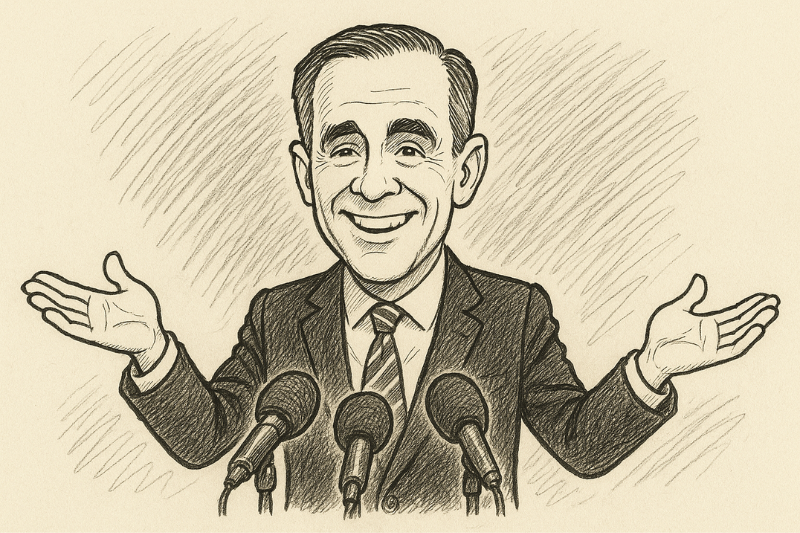On a weekend when most of us were probably arguing about whether to turn on the Christmas lights before December or worrying about our fantasy football lineups, Prime Minister Mark Carney was asked by a reporter when he last spoke to U.S. president Donald Trump.
His answer: “Who cares?”
The words landed with the blunt force of a hockey puck to the boards. In the careful world of diplomatic speak, where leaders typically perform linguistic gymnastics to avoid saying anything remotely interesting, Carney’s response was refreshingly human. More importantly, it was leadership distilled to its essence.
This isn’t about politics. This isn’t about whether you think Carney is doing a good job navigating the choppy waters of U.S.-Canada relations, or whether you believe Trump’s tariff threats are economic terrorism or legitimate negotiation tactics. Strip away the geopolitical theatre, and what you’re left with is a principle that every HR director, CEO, and middle manager should tattoo somewhere visible: focus on what you can control.
Last month, Carney said Canada’s government was “focused on what we can control.” Now he’s doubled down. When pressed about Trump, about trade talks that collapsed in the wake of Ontario’s anti-tariff ad, about the relationship between two countries that share the world’s longest undefended border and billions in daily trade, the prime minister essentially said: I’m not losing sleep over things I can’t fix with a phone call.
That’s not flippancy. That’s sanity.
Walk into any organization today and you’ll find a few leaders drowning in anxiety about forces beyond their reach. Inflation. Recession fears. AI disruption. Labour shortages. Regulatory changes. Global supply chains that sneeze when a ship gets stuck in the Suez Canal. The list is endless, and it’s growing faster than anyone’s capacity to manage it.
The default response? Stress. Meetings about the stress. Task forces to address the things causing stress. All-hands emails acknowledging everyone’s stress. It’s stress all the way down.
But here’s what nobody wants to admit: most of that stress is performance art. We’ve convinced ourselves that worrying about the uncontrollable is part of the job, that a good leader must publicly agonize over every external threat. We mistake anxiety for diligence, as if the depth of our concern somehow correlates to the quality of our leadership.
It doesn’t.
Carney’s “who cares?” isn’t callousness — it’s clarity. He’s not saying the U.S. relationship doesn’t matter. He’s saying that obsessing over whether Trump returns his calls is a waste of time that could be spent on things Canada can actually influence. Things like strengthening trade relationships with other countries. Shoring up domestic industries. Preparing for multiple scenarios. You know, leading.
The same logic applies inside your organization. Your competitor just poached three of your best people. Who cares? You can’t control what they do. You can control whether you’re creating an environment where people want to stay. The economy might tank next quarter. Who cares? You can’t control macroeconomic forces. You can control whether your team is nimble enough to adapt. AI might eliminate half the jobs in your sector within five years. Who cares? You can’t stop technological change. You can control whether you’re investing in your people’s ability to evolve with it.
This isn’t about sticking your head in the sand. It’s about refusing to let external chaos dictate your internal state. It’s about recognizing that leadership isn’t measured by how many fires you’re aware of, but by how effectively you respond to the ones within your reach.
The best leaders I’ve encountered share this quality. They acknowledge reality without being paralyzed by it. They scan the horizon for threats, then make decisions based on what they can actually do about them. They don’t waste energy performing concern. They save it for action.
There’s a reason Carney’s remark caught attention. In a world where leaders often seem powerless against forces larger than themselves — where CEOs shrug and blame “market conditions,” where politicians point fingers at their predecessors, where managers cite “the economy” as the reason they can’t give raises — here was someone drawing a line. Here’s what matters. Here’s what doesn’t. And I’m not going to pretend otherwise.
Your people are watching. They notice when you waste time in meetings discussing things nobody in the room can change. They notice when you spiral into worst-case scenario planning about threats that may never materialize. They notice when you’re so busy worrying about the future that you’re missing opportunities in the present.
They also notice when you’re focused. When you’re calm. When you’re directing energy toward things that matter because they’re within your sphere of influence. That’s not just good leadership — it’s contagious.
Carney’s “who cares?” won’t solve the trade tensions between Canada and the United States. But it might remind the rest of us that leadership isn’t about controlling everything. It’s about knowing what’s worth your attention — and having the spine to dismiss what isn’t.





